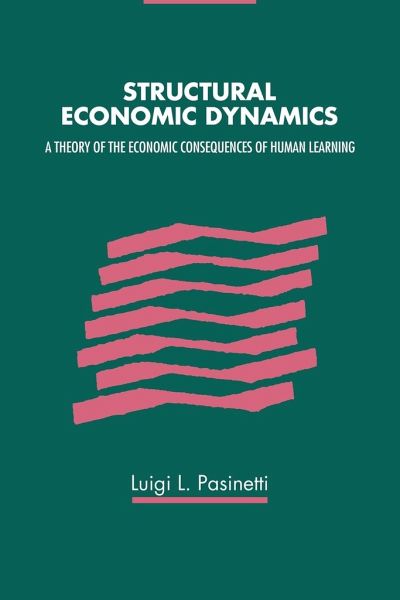
Structural Economic Dynamics
Versandkostenfrei!
Versandfertig in 1-2 Wochen
52,99 €
inkl. MwSt.

PAYBACK Punkte
26 °P sammeln!
This book is a theoretical investigation of the development through time of a 'pure labour' economy.This book is a theoretical investigation of the influence of human learning on the development through time of a 'pure labour' economy. The theory proposed is a simple one, but aims to grasp the essential features of all industrial economies. Economists have long known that two basic phenomena lie at the root of long-term economic movements in industrial societies: capital accumulation and technical progress. Attention has been concentrated on the former. In this book, by contrast, technical pro...
This book is a theoretical investigation of the development through time of a 'pure labour' economy.
This book is a theoretical investigation of the influence of human learning on the development through time of a 'pure labour' economy. The theory proposed is a simple one, but aims to grasp the essential features of all industrial economies. Economists have long known that two basic phenomena lie at the root of long-term economic movements in industrial societies: capital accumulation and technical progress. Attention has been concentrated on the former. In this book, by contrast, technical progress is assigned the central role. Within a multi-sector framework, the author examines the structural dynamics of prices, production and employment (implied by differentiated rates of productivity growth and expansion of demand) against a background of 'natural' relations. He also considers a number of institutional problems. Institutional and social learning, know-how, and the diffusion of knowledge emerge as the decisive factors accounting for the success and failure of industrial societies.
Review quote:
"Pasinetti's careful and lucid analysis yields valuable insights into some of the most complex and seemingly intractable problems confronting industrialized nations in the 1990s."
Christopher Brown, Journal of Economic Issues
"...every reader will benefit, both at an elementary and at a more advanced level."
Bertram Schefold, Journal of Economic Literature
Table of contents:
Preface; Acknowledgements; List of symbols; 1. Economic theory and the neglect of structural change; 2. A pure labour production economy; 3. Proportional dynamics; 4. Structural dynamics; 5. The evolving structure and level of prices; 6. Consumption, savings, rate of interest and inter-temporal distribution of income; 7. On the evolving structure of long-term development; 8. From the 'actual' towards the 'natural' economic system - the rôle of institutions; 9. Boundedness of economic systems, and international economic relations; References; Index.
This book is a theoretical investigation of the influence of human learning on the development through time of a 'pure labour' economy. The theory proposed is a simple one, but aims to grasp the essential features of all industrial economies. Economists have long known that two basic phenomena lie at the root of long-term economic movements in industrial societies: capital accumulation and technical progress. Attention has been concentrated on the former. In this book, by contrast, technical progress is assigned the central role. Within a multi-sector framework, the author examines the structural dynamics of prices, production and employment (implied by differentiated rates of productivity growth and expansion of demand) against a background of 'natural' relations. He also considers a number of institutional problems. Institutional and social learning, know-how, and the diffusion of knowledge emerge as the decisive factors accounting for the success and failure of industrial societies.
Review quote:
"Pasinetti's careful and lucid analysis yields valuable insights into some of the most complex and seemingly intractable problems confronting industrialized nations in the 1990s."
Christopher Brown, Journal of Economic Issues
"...every reader will benefit, both at an elementary and at a more advanced level."
Bertram Schefold, Journal of Economic Literature
Table of contents:
Preface; Acknowledgements; List of symbols; 1. Economic theory and the neglect of structural change; 2. A pure labour production economy; 3. Proportional dynamics; 4. Structural dynamics; 5. The evolving structure and level of prices; 6. Consumption, savings, rate of interest and inter-temporal distribution of income; 7. On the evolving structure of long-term development; 8. From the 'actual' towards the 'natural' economic system - the rôle of institutions; 9. Boundedness of economic systems, and international economic relations; References; Index.




